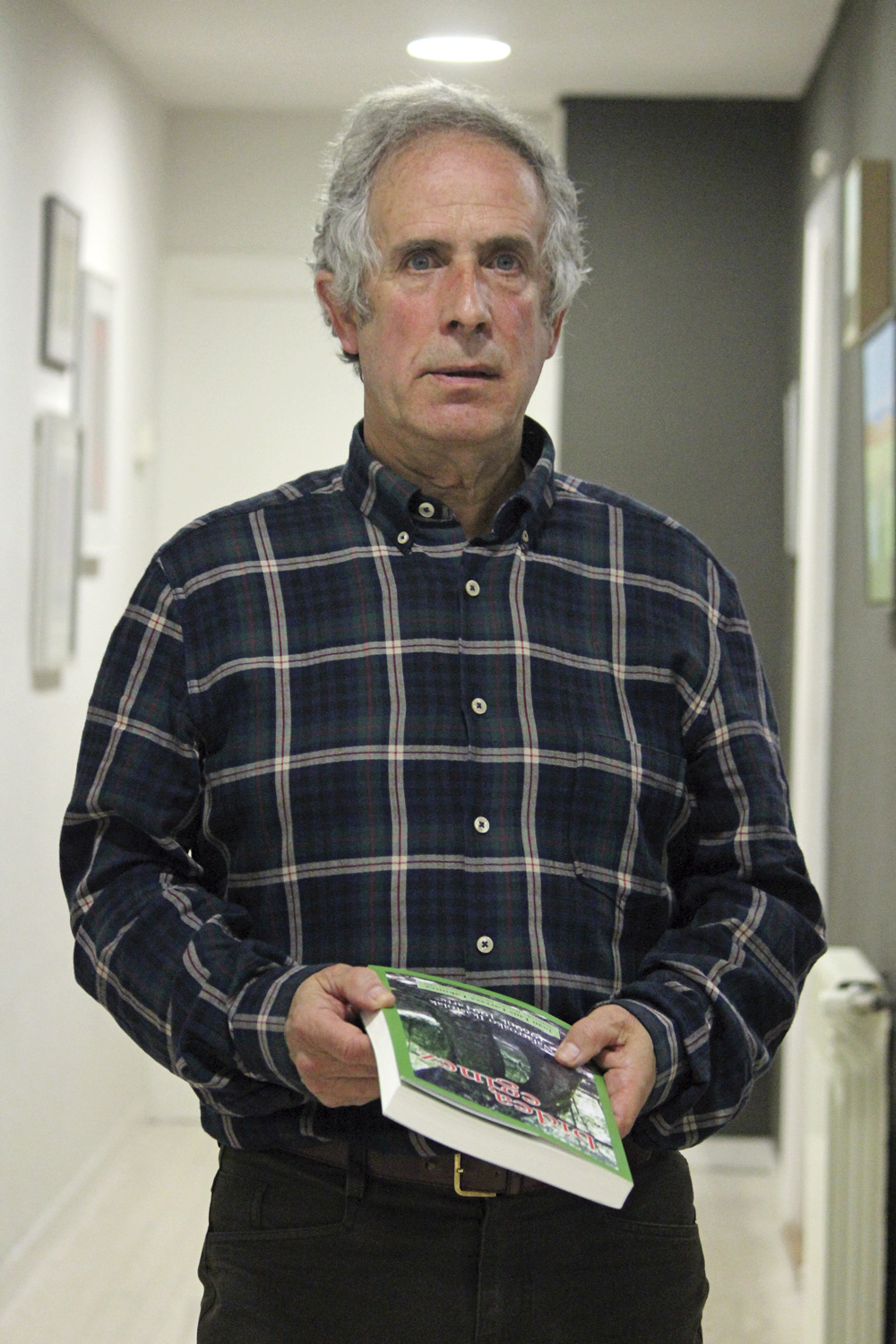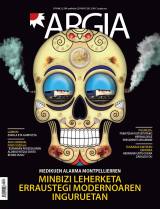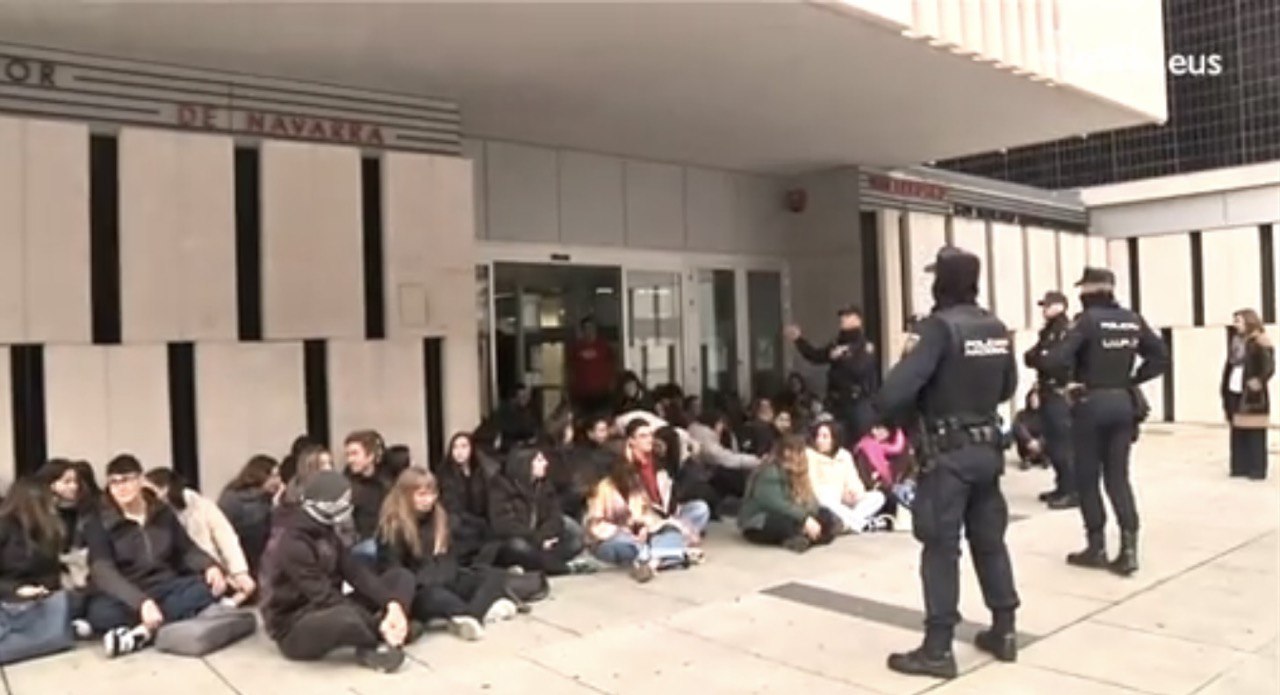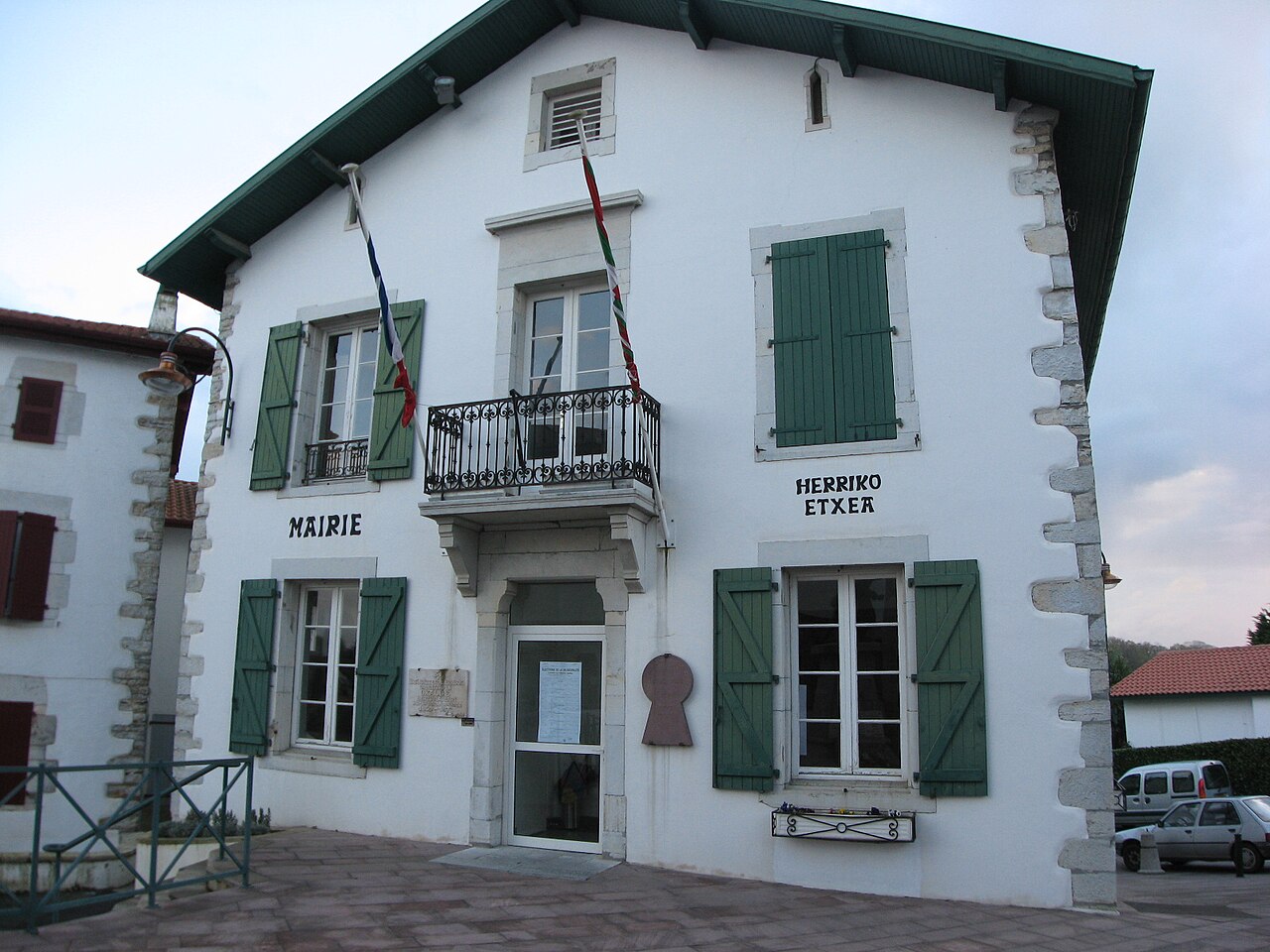"The Ikastola has to follow its path in Navarre, and if possible create new ones"
- In the key years he led the Federation of Ikastolas of Navarra, and following the guidelines of the committee in turn he headed the direction of the Navarre ikastolas. He's always tired, often ungrateful. He worked for fourteen years, until he decided to leave. He just told it in the self-edited book Bidea egiten. I couldn't stop telling her truth.

Zangozako ikastolan erretiratu zen orain dela zortzi urte. Lehenago, hala ere, bizialdia markatu dioten hamalau urte bete zituen Nafarroako Ikastolen Elkartean lanean. Zuzendari zen, nafar ikastolen eta garaiko zuzendaritza batzordearen konfiantza erabatekoa zuen. Alabaina, dimisioa eman zuen 1991n. Erabaki traumatikoa, betiko sartua arantza, Bidea eginez liburua idatziz atera ahal izan duena. Hein batean, bederen.
The book Bidea egiten duzu, which narrates the trajectory of the Ikastolas of Navarra between 1969 and 1991.
In 1991 I left the Federation of Ikastolas of Navarre, being its director. Anyway, I didn't quit the job, I made a forced decision by others, it was tough, and since then I picked up, closed down, and for a while I didn't want to know anything about the ikastolas. Three years after I left the partnership, I started at the ikastola in Sangüesa, but as a professor, without any leadership responsibility. I have been there for many years, until now, after twenty-five years, I have flushed out the worm. On the other hand, various works have been published on the ikastolas of Navarra, such as the doctoral thesis of Irene López or the Dream of the Ikastolas Association, in which I have also participated. But I believe that my words have not been properly taken up in those works – they have used scissors – and I have had to make my own version.
What is its version?
I believe that in this world we all too easily celebrate names, and we forget and reject others; I mean, a great many people who have distinguished themselves for their work. That is what happens in the case of small towns, which are nowhere to be mentioned. My wish was to collect the history of all the ikastolas, to collect the names of the people who have worked on the implementation of the ikastolas, to also write special histories and stories. I wanted to praise the parents, teachers and collaborators who tried it in difficult times, who in the Basque peoples opposed the initiative of the Spanish Ministry.
What is this initiative of the Spanish Ministry?
In many small Basque villages, children knew only Basque. They came to the school age of 6 and they didn't know Spanish. And the teachers back then complained. The Spanish Ministry then created children's schools in the Basque municipalities with the objective of allowing children to study in Spanish before the age of 6. These children's schools were opened in Sunbilla, Leitza and others. In this book I wanted to praise those who tried to subvert, and with them those who tried in the towns of Euskal Herria for the Basque Country, which in other times received many contempt. I wanted to explain the life experience of each other and thank them for their efforts. My intention was to make known many of the small missing ikastolas, mentioning the living ikastolas, of course.
We would not immediately know that in some small towns there had been ikastolas.
40 years ago I had the agenda and the notes saved, as I have long liked to keep the papers. Take the agenda, find the phone of that people, call and call: “He died a long time ago.” In some cases, my contacts then are dead or very ill. On one occasion, I was told it was a ikastola in the village and I was denied it. “How there have been no ikastolas in your people, because I was there. It was the ikastola here. He had such and such interlocution.” “Ah, they’ve already died, I don’t know anything about the ikastola that you say.” In this sense, it has been difficult to find the thread of many ikastolas and pull it out.

I would like to stress the importance of small peoples.
Because they have been of great importance in the process of Euskaldunization of the Navarre educational system. In the mid-1980s, the birth rate plummeted in Navarre, and in small towns there were not enough children to form the ikastola. Of course, there was no money. And the premises of those ikastolas were also. In the small towns something had to be done, a few steps had to be taken. In the great Basque peoples, on the other hand, the generation of teachers was renewed: the former professors retired and the new ones brought another spirit. Thanks to this, the ikastola and the school joined and the teaching was channeled only in Euskera. The Federation of Ikastolas of Navarra always collaborated, when they were similar projects, with the advice of Lontxo Oihartzabal and Mikel Lasa. At the same time, the Spanish Ministry was playing a bit open, and its inspector, Rafael Guimera, gave facilities to merge the ikastolas and the schools, ensuring the creation of model D in these centers. In some ikastola, conciliation was traumatic, as in Leitza, but in most cases there was no problem.
The ikastola needed public or private, the debate was hot.
A sterile debate, in my opinion, seriously harmed the ikastola movement and, in general, the teaching of the Basque country. In Pamplona, for example, the municipal ikastola, of public ownership, was created, although it functioned like the rest of the public ikastolas. However, I think the ikastola driven by a parent cooperative is much more public than the transferred school. There was talk of advertising, but it was meant to be gratuitous, which sparked a great debate in the ikastolas. In addition, more than one ikastola with a vocation to be public had to close its doors, and the Herri Ikastola of Pamplona/Iruña witnesses this. The hole in the money had eaten it. The same happened to Hiruherri, the ikastola founded by the progressive municipalities of Burlada, Villava and Huarte, who was unable to resist by imposing the forces of the right in the municipalities. They ran out of money to finance the project and the ikastola had to be closed. Public or private, I think it was a futile discussion.
What happened in 1991? “On October 8, after working for fourteen years at the Association of Ikastolas of Navarra created by himself, Juan Luis Larraza, director until then, decided to leave it in silence and without giving any explanation,” we read at the end of the book.
It's been 27 years and I still don't know very well what happened. This is the final question in the book. Since 1988, the Government of Navarra has drawn up a proposal for an agreement to standardize the situation of ikastolas on the basis of the Spanish education law. This law was the LODE, which specified the number of children, residence, educational levels, services and so on. In small villages, they couldn't comply with the laws, they couldn't comply with them. The low birth rate and the closure of two or three ikastolas each year. For its part, the Government of Navarra, in the small towns that had ikastolas and in some of the large ones, promised to implement teaching in Basque, giving the teachers a period of three years to access by opposition to their place.
The then Federation of Ikastolas of the Basque Country wanted something else.
Yes, and he prepared an alternative document based on the Law of the Vascuence of Navarra, claiming that they were public centers and asking for the institutionalization of the ikastolas. However, the situation of small peoples was unworkable and, at their request, on 4 July 1990, the President of the Government, Gabriel Urralburu, and the President of the Federation of Ikastolas of Navarra, Txomin IZKO, signed the agreement. As a result, in twelve villages, the ikastolas ceased to be ikastolas and were integrated into the transferred schools.

Inevitably, in his view.
Yes, because the small ikastolas were closing and closing. The ikastolas of some peoples, for example, could not reach an agreement, because they were closed in previous years. In these cases, the children were left without the possibility of studying in Euskera, and the teachers were left without work. It was the case of Olague, for example. The Government of Navarra wanted to integrate into its network all the ikastolas of the Basque peoples: Leitza, Bera, Lesaka, Etxarri Aranatz and all that I could. In the villages, however, the ikastola was already consolidated and the Government of Navarre refused, with the exception of Leitza, to continue the march.
The ikastolas of Leitza do not.
The agreement was concluded on 4 July, and in August, Leitza, who until then did not want to join the network of the Government of Navarra, decided to meet in an assembly and reach an agreement with eight votes of difference. This brought many knots and a lot of tension, and given the impossibility of taking me the situation resigned the president of the Federation of Ikastolas of Navarra, Txomin IZKO, who also left the job, and I stayed until September.
It says that the small ikastolas wanted an agreement.
Yes, they needed an agreement, because every year the doors were closed drifting. The agreement was signed at the request of the small ikastolas, and then the biggest problems came to us from the Federation of Ikastolas of the Basque Country. The Federation of Ikastolas of Gipuzkoa did not accept our decision.
That's your truth, the one you wanted to tell.
What I wanted to count without scissors, and what I've told in this book, I published it on my own. However, I have spoken rather sweetly and superficially about diplomacy. But the truth is, I don't know what was of political or strategic interests, I don't know. At that time, you couldn't do anything else. I've walked from village to village collecting information to be able to complete this book, knowing that the society that was working to push through the ikastolas of that time was very strong. Now, when I went back to those companies, I found the same strength, the same friendship and complicity. And the same is true of the members of the Federation of Ikastolas of the Basque Country.
You have pulled your thorn out of it with the written book.
Yes. When I could shake the agenda and the notes I had at home, I realized I had to write. The specific case that has led me to leave the address is not worth telling in the book, it does not serve to write the book. That will rot between the papers. However, I tell him, when I was able to return to documentation, interviews and then articles, I did not hesitate: “Juan Luis, now is the time to write!” And I think the people who have worked so hard on the ikastolas deserve a tribute. I've dedicated my work to those people. Unfortunately, some are ill, others are dead.
How do you see the situation of Euskera in the educational centers of Navarra today?
To begin with, it seems dangerous to me to say that in Navarre the Basque country has a future in the transferred schools. Who ensures that the government will maintain support for the Basque people? Every day the newspaper takes, there is a confrontation around the Basque country, the lists and the dossiers of both. In politics, the forces are equal. We live in the situation of election results. That is the reality of Navarre. As long as the ikastola is, and as long as the government tries to make the way, it will also try to fight for the Basque. If I didn't have the ikastola competition, I don't know. The Basque country has travelled Navarre thanks to the ikastola.
So he's gone down the road.
In the 1970s, Euskera was about to disappear in many localities. In Etxarri Aranatz, for example. Nowadays, boys and girls, boys and young people, speak in Basque. That was done by the ikastola. Has the transferred school done so?... The Ikastola must go ahead, strengthen itself and, if possible, create new ones in the Castilian speaking villages. You have to stop playing in defense, you have to attack.
“Gozatzen ari naiz. Gozatu dut liburua osatzeko informazio biltzen, eta gozatzen ari naiz orain herriz herri nabilela, liburua aurkezten. Batetik, garai bateko jendearekin elkartzeko aukera dut, eta bestetik, hezkuntzari buruzko gogoeta partekatzeko.
Teknologia nagusi den garaian –tableta eta sakelakoa darabiltzate, oroz gain, gure ikasleek–, euskara bidegurutzean dago berriz”
“Frankismo amaierako garaian borrokatzea gertatu zitzaigun, eta hein batean erraza izan zen hura, guztiz motibaturik baikeunden. Oraingo gazteek ez dute motibaziorik eta gu, aldiz, lekuz kanpo gaude. Liburua aurkezten Igantzin, Altsasun, Etxarri Aranatzen, Beran eta bestetan izan naizelarik horixe esan didate, katea eten egin dela, belaunaldi berriak ez duela garai batekoarekin kontatzen”
“Ez dakit borroka egiten asmatu genuen. Egin zitekeena egin genuen. Gehiago egin zitekeela dudarik ez, baina ez genuen baliabiderik ez oraingo ikuspegirik ere. Hemendik aurrerakoa belaunaldi berriei dagokie, helburuak pentsatu eta haietara iristeko urratsak eman”
“Ez du merezi den-dena kontatzea, izen guztiak-eta. Klabe diren izenak agertzen dira, hala ere, ulertu nahi duenak ulertuko du. Ulertu nahi ez duenak, berriz, esango du: ‘Ez du ezer esaten!’. Baina hor daude izenak. Batzuk, denak ez”
In recent decades I have worked in the Basque field, both in the Euskaldunization of adults in AEK, and in the defence of linguistic rights in the Observatory, or in favour of the normalization of the Basque country in the Council of Euskalgintza. Everywhere I have heard... [+]
The SEASKA federation has been able to enter the programme with a hundred more students than last year. With two-year-olds joining in the coming months, the limit of 4,300 pupils will be exceeded. In the first year, the increase is 33 students, but the most outstanding is the... [+]













.jpg)
.jpg)

.jpeg)




